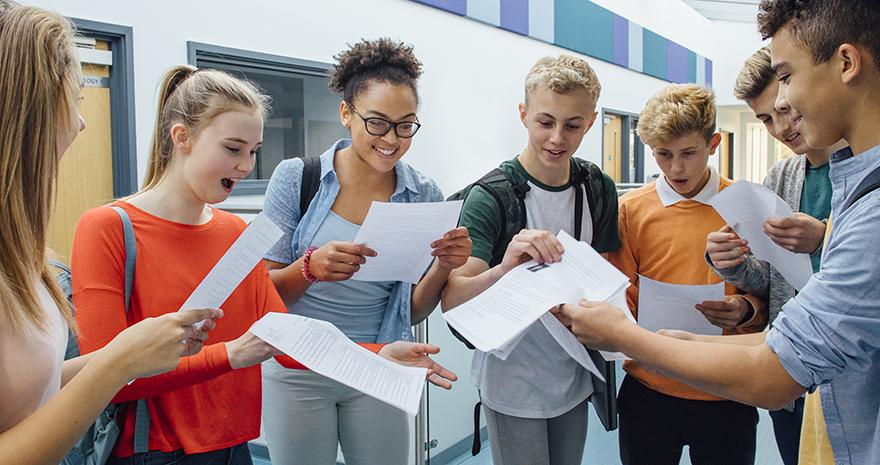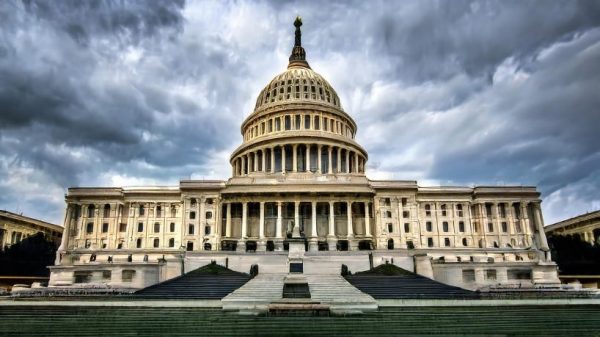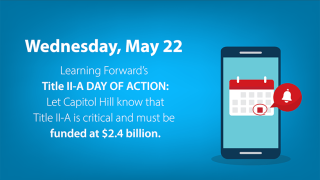Learning Forward is leading a broad education coalition to persuade members of U.S. Congress of the urgent need to invest in educators and their students by providing $2.4 billion for Title II, Part A in fiscal year 2024 appropriations. This funding level is necessary for Title II-A to be able to fulfill its original promise of improving teaching and learning in every school. Title II-A is provided through the Elementary and Secondary Education Act.
Title II-A funds are the largest federal government investment in educator professional learning. A 2022 U.S Department of Education report on Title II-A found that the most common uses of Title II-A funds are for professional learning, recruiting, hiring, and retaining teachers. Learning Forward convened a virtual Capitol Hill briefing to talk about how professional learning is critical to retain teachers, intensify academic recovery, and meet the needs of all students.
Learning Forward encourages educators to share their stories of how high-quality professional learning has shifted their practices for the better, and leaders to share outcome data from their systemic implementation of standards-aligned professional learning. We publish stories of high-quality professional learning in action in every issue of The Learning Professional magazine. Here are three stories featured in recent issues that demonstrate the power of high-quality professional learning, from Thurgood Marshall Elementary’s literacy work in Richardson, Texas; Louisiana’s initiative to support all new teachers with well-prepared and supported mentors; and Missouri’s bold commitment to attracting and retaining teachers through high-quality professional learning and other supports.
Texas: Educator’s professional learning is improving literacy outcomes
Noline Martin, assistant principal at Thurgood Marshall Elementary in Richardson, Texas, chose participating in the Learning Forward Academy as a path to learning how to improve literacy rates at her school, where only 19% of 3rd graders were reading at grade level a few years ago. Her district’s professional learning office supported her attendance at the in-person Academy meetings so she could work to solve her problem of practice, which was increasing the percentage of students who are proficient readers by the time they complete 3rd grade. She parlayed her Academy experiences into action, setting up a book study with K-3 teachers, developing professional learning communities that united teachers and staff around literacy instruction methods, and creating opportunities for teachers across grades to look at reading data together to identify changes in practice and outcomes. Thurgood Marshall’s 3rd graders have since made huge strides: for the last two years, over 83% met or exceeded the school’s growth goals in reading. Read the entire story.
Louisiana: Believe and Prepare finds that mentors make a difference
Recognizing the need to more effectively support and retain new teachers, the Louisiana Department of Education launched the Believe and Prepare pilot program in 2014. This teacher preparation program offered aspiring teachers a full year of practice under an expert mentor and a competency-based program design. The program goal was to ensure that new teachers had the tools and support to succeed from year one. In 2016, Louisiana’s education agency selected Learning Forward to design and facilitate a mentor teacher training program that provided expert teachers across the state with tools and skills to more effectively support teachers in their systems through their first three years of teaching. After this three-year partnership concluded, outcomes from the program showed that over all cohorts from 2017 to 2020, 95% of participating mentors reported feeling “prepared and confident to mentor resident and novice teachers.” Believe and Prepare became mandatory in 2018. According to a 2022 report on the initiative, teachers who completed a program that had implemented Believe and Prepare were 2 percentage points more likely than teachers who completed a program that had not implemented it to stay in Louisiana for at least one year and 7 percentage points more likely to stay in the same school district for at least three years. Read the entire story.
Missouri: State invests in multipronged effort to attract, retain teachers and leaders
Missouri’s public schools, which serve nearly 900,000 students, have been seeing teacher retention rates decline, as is the trend in many states. Paul Katnik, Assistant Commissioner at the Missouri Department of Elementary and Secondary Education, recently detailed his state’s coordinated efforts to ensure the educator workforce is well-prepared and committed for the long-term. High-quality, standards-aligned professional learning, Katnik said, is “a key part of our multifaceted strategy.” The state board of education established a commission focused on teacher recruitment and retention, and nearly $55 million has been directed toward recruitment and retention grants for districts to directly address the state’s teacher supply and demand issues. Local education agencies reported using those grants for a range of strategies and supports that include professional learning in the form of mentoring and leadership opportunities, and creating a culture where teachers feel appreciated and valued, in addition to instrumental supports like higher salary.
Katnik has called Title II-A funds critical for this type of work. “What we do with those funds is we work with thousands of principals and teachers across the state to try to help and support them at the work that they do.” And, he says, it’s making a difference. Katnik told a Learning Forward advocacy gathering last September that Missouri’s use of funds received a commendation when it was audited by the U.S. Department of Education. Read the entire story.






